The Hemp Oil Infused Skincare Market is expected to record a valuation of USD 1,123.8 million in 2025 and USD 3,733.2 million in 2035, with an increase of USD 2,609.4 million, which equals a growth of 193% over the decade. The overall expansion represents a CAGR of 12.8% and a 2X increase in market size.
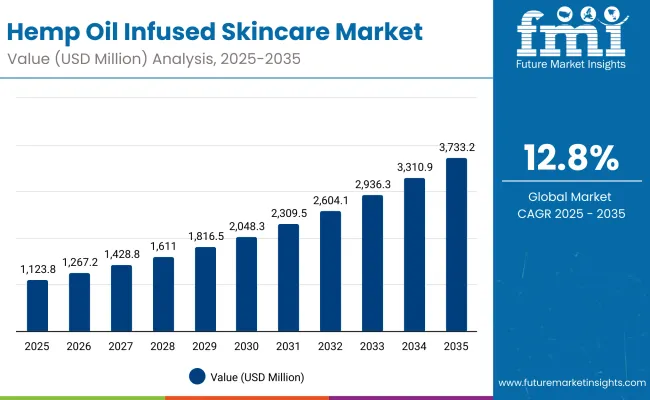
| Metric | Value |
|---|---|
| Hemp Oil Infused Skincare Market Estimated Value in (2025E) | USD 1,123.8 million |
| Hemp Oil Infused Skincare Market Forecast Value in (2035F) | USD 3,733.2 million |
| Forecast CAGR (2025 to 2035) | 12.8% |
During the first five-year period from 2025 to 2030, the market increases from USD 1,123.8 million to USD 2,048.3 million, adding USD 924.5 million, which accounts for 35% of the total decade growth. This phase records steady adoption of moisturizing and anti-inflammatory applications, supported by growing demand for natural/organic skincare and wider e-commerce availability. Natural/organic claims dominate this period, representing more than half of the segmental revenues in 2025.
The second half from 2030 to 2035 contributes USD 1,684.9 million, equal to 65% of total growth, as the market jumps from USD 2,048.3 million to USD 3,733.2 million. This acceleration is powered by the mainstreaming of hemp-infused beauty, expansion into anti-aging and skin barrier repair, and strong uptake in Asia-Pacific markets. E-commerce and specialty beauty stores gain prominence, while premium brands integrate clean-label and sustainable sourcing claims, pushing the competitive landscape toward higher-value product positioning.
From 2020 to 2024, the Hemp Oil Infused Skincare Market expanded steadily, supported by the mainstreaming of CBD-infused beauty, demand for natural/organic claims, and early adoption in North America and Europe. Premium players such as Kiehl’s and The Body Shop emphasized moisturizing and anti-inflammatory products, while indie brands like Cannuka and Herbivore Botanicals gained share through clean-label positioning.
In 2025, demand is projected at USD 1,123.8 million, rising to USD 3,733.2 million by 2035. Revenue composition is shifting toward e-commerce and specialty beauty channels, which already capture nearly half of global sales. The competitive advantage is moving beyond brand legacy alone to sustainable sourcing, clinical validation, and consumer trust in natural claims, with Asia-Pacific brands increasingly challenging Western incumbents through affordability and rapid product innovation.
Growth is fueled by hemp oil’s proven anti-inflammatory and antioxidant benefits, which support conditions like eczema, psoriasis, and acne. This clinical positioning moves hemp oil from niche wellness into mainstream dermatology, strengthening demand across both prescription-linked and premium over-the-counter skincare formulations.
China and India are driving rapid uptake as local beauty brands integrate hemp oil into affordable, mass-market skincare. Supported by cultural acceptance of plant-based remedies and expanding e-commerce platforms, these regions are shifting growth momentum away from Western markets, delivering double-digit expansion beyond global averages.
The market is segmented by function, product type, channel, claim, and region. Functions include moisturizing, anti-inflammatory, anti-aging, and skin barrier repair, reflecting the therapeutic and cosmetic applications of hemp oil in skincare. Product type segmentation covers oils, creams and lotions, serums, and balms, addressing diverse consumer preferences and formulation needs.Based on channel, the segmentation includes e-commerce, mass retail, pharmacies, and specialty beauty stores, capturing the shift toward online sales alongside continued reliance on physical outlets. In terms of claims, categories encompass natural/organic, vegan, clean-label, and sustainable sourcing, highlighting rising consumer demand for safe, plant-based, and ethically sourced skincare products. Regionally, the scope spans North America, Europe, East Asia, South Asia & Pacific, Latin America, and the Middle East & Africa. Country-level insights identify the USA, China, Japan, Germany, the UK, and India as major growth drivers, supported by varying adoption trends, regulatory frameworks, and distribution dynamics.
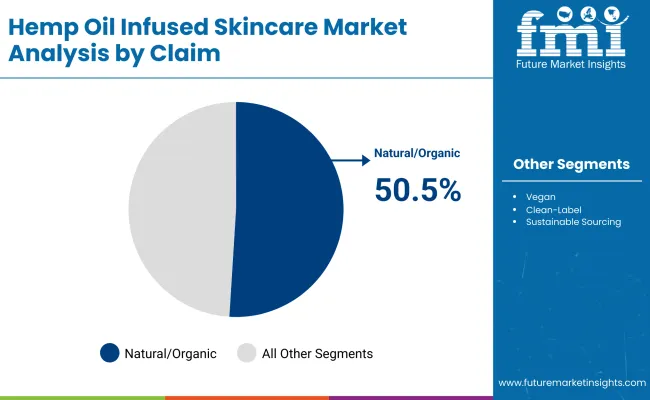
| Claim | Value Share% 2025 |
|---|---|
| Natural/organic | 50.5% |
| Others | 49.5% |
The natural/organic segment is projected to contribute 50.5% of Hemp Oil Infused Skincare Market revenue in 2025, maintaining its lead as the dominant claim category. This leadership is driven by consumer preference for plant-based, chemical-free formulations that align with clean beauty trends and heightened awareness of ingredient transparency.
The segment’s growth is reinforced by premium positioning in both online and offline retail, where natural/organic claims carry strong consumer trust. Brands are leveraging hemp oil’s therapeutic reputation to position products as safe, sustainable, and clinically effective. As demand for ethically sourced skincare continues to rise, the natural/organic claim is expected to remain a cornerstone of the market’s expansion.
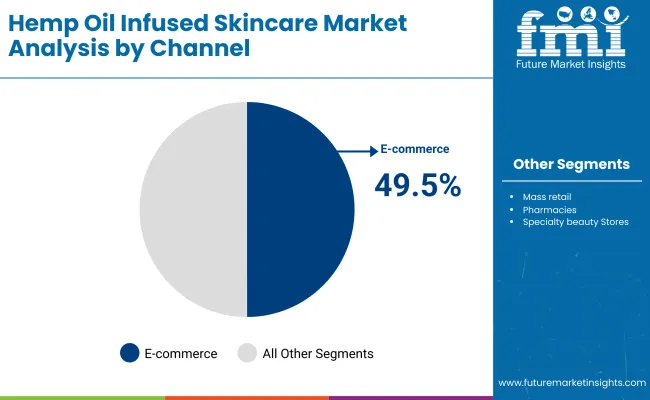
| Channel | Value Share% 2025 |
|---|---|
| E-commerce | 49.5% |
| Others | 50.5% |
The e-commerce segment is forecasted to account for 49.5% of Hemp Oil Infused Skincare Market revenues in 2025, emerging as one of the most dynamic distribution channels. Online platforms are favored for their convenience, wide assortment, and ability to directly target consumers with personalized recommendations. This makes them highly effective in promoting hemp oil skincare to younger and digitally active demographics.
E-commerce adoption is further supported by social media marketing, influencer-led promotions, and subscription-based models that encourage recurring purchases. As clean-label and natural/organic claims align strongly with digital-native consumers, online channels are becoming the first point of discovery for new hemp-infused skincare products. With expanding cross-border sales and direct-to-consumer strategies, e-commerce is expected to remain central to market growth.
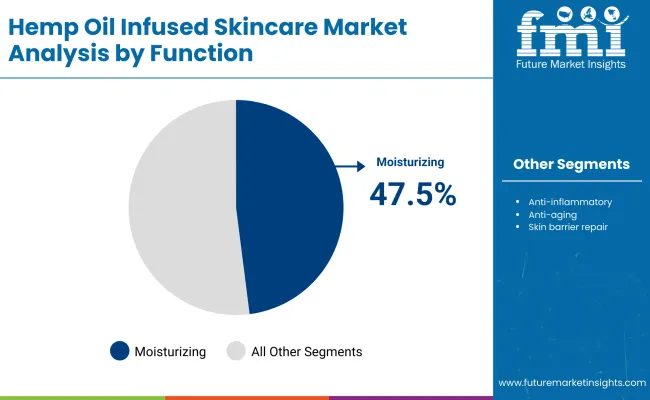
| Function | Value Share% 2025 |
|---|---|
| Moisturizing | 47.5% |
| Others | 52.5% |
The moisturizing function is projected to contribute 47.5% of Hemp Oil Infused Skincare Market revenues in 2025, making it one of the most prominent application areas. Hemp oil’s rich fatty acid profile and natural emollient properties make it highly effective in maintaining hydration, improving skin texture, and preventing dryness.
This function’s popularity is reinforced by rising demand in both premium and mass-market skincare categories, where consumers seek natural alternatives to synthetic moisturizers. Brands are leveraging hemp oil’s dual positioning as both a hydrating and soothing agent, targeting urban populations affected by pollution and climate-related skin stress. With its broad appeal across age groups and product formats, moisturizing is expected to remain the anchor segment of the market.
Growing Integration of Hemp Oil in Dermatology-Backed Formulations
Hemp oil is increasingly incorporated into dermatologist-tested and clinical-grade skincare due to its anti-inflammatory, antioxidant, and moisturizing properties. Unlike generic plant extracts, hemp oil is being validated in controlled studies for treating acne, eczema, and aging concerns. This scientific endorsement enhances its credibility with both practitioners and consumers, fueling growth across premium skincare, over-the-counter creams, and therapeutic products. The rising alignment between clinical validation and consumer preference is transforming hemp oil into a mainstream functional ingredient.
Rapid Uptake in Asia-Pacific with Local Brand Innovation
The Asia-Pacific region is emerging as a growth hotspot, with China (23.3% CAGR) and India (22.1% CAGR) driving adoption. Local brands are launching affordable hemp oil formulations tailored to price-sensitive demographics, while e-commerce platforms amplify reach in tier-2 and tier-3 cities. Cultural familiarity with herbal remedies further accelerates acceptance, making hemp oil-infused skincare both aspirational and accessible. This regional momentum not only expands consumer bases but also challenges Western incumbents by reshaping competitive dynamics with localized affordability and faster product innovation.
Regulatory Ambiguity and Ingredient Stigma
Despite strong growth potential, the hemp oil skincare market faces hurdles from varying regional regulations and persistent stigma around cannabis derivatives. While hemp oil is non-psychoactive, consumer misconceptions often delay acceptance, particularly in conservative markets. Regulatory inconsistencies across regions add compliance costs for multinational brands, slowing product rollouts. This ambiguity disadvantages smaller entrants unable to navigate complex legal frameworks, leaving the market fragmented. Clearer guidelines and consumer education are essential to fully unlock hemp oil’s growth trajectory in global skincare applications.
Premiumization Through Clean-Label and Sustainable Claims
A strong trend shaping the market is the premiumization of hemp oil skincare, supported by rising demand for clean-label, vegan, and sustainably sourced formulations. Consumers increasingly associate hemp oil with ethical and eco-conscious choices, creating differentiation opportunities for brands. Companies are pairing hemp oil with other botanicals and positioning products as holistic wellness solutions. This trend is amplified by digital-first marketing and influencer-driven endorsements, particularly among millennials and Gen Z. Premium branding, combined with sustainability messaging, is expected to drive higher margins.
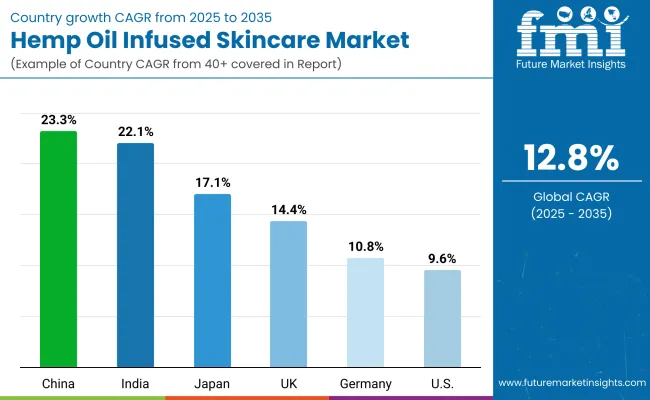
| Countries | Estimated CAGR (2025 to 2035) |
|---|---|
| China | 23.3% |
| USA | 9.6% |
| India | 22.1% |
| UK | 14.4% |
| Germany | 10.8% |
| Japan | 17.1% |
The global Hemp Oil Infused Skincare Market shows clear disparities in adoption, influenced by consumer preferences, regulatory frameworks, and distribution channels.Asia-Pacific emerges as the fastest-growing region, led by China (23.3%) and India (22.1%). Growth here is driven by local brand innovation, rising e-commerce penetration, and cultural acceptance of plant-based skincare. China benefits from strong domestic players offering competitively priced hemp oil creams and serums, while India’s expansion reflects growing demand in tier-2 cities and its role as a cost-competitive hub for natural beauty products.
Japan (17.1%) adds momentum, with hemp oil positioned in anti-aging and premium wellness routines.Europe maintains steady growth, led by the UK (14.4%) and Germany (10.8%), supported by high consumer awareness of clean-label skincare and regulatory emphasis on natural ingredients. Germany’s market reflects strong adoption in moisturizing and anti-inflammatory products, while the UK benefits from premium private-label launches and specialty beauty store distribution.
North America shows moderate expansion, with the USA at 9.6% CAGR, reflecting maturity of the natural skincare sector. Growth is supported by premiumization, clean-label claims, and increasing adoption of hemp oil among dermatology-backed brands. However, expansion is slower compared to Asia-Pacific, where affordability and accessibility are accelerating mainstream acceptance.
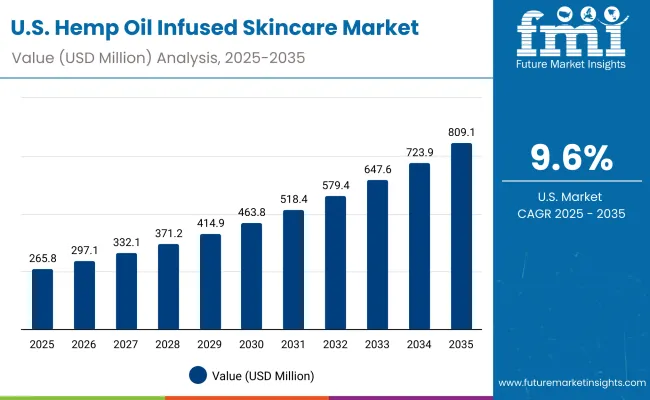
| Year | USA Hemp Oil Infused Skincare Market (USD Million) |
|---|---|
| 2025 | 265.89 |
| 2026 | 297.19 |
| 2027 | 332.17 |
| 2028 | 371.28 |
| 2029 | 414.98 |
| 2030 | 463.83 |
| 2031 | 518.44 |
| 2032 | 579.47 |
| 2033 | 647.68 |
| 2034 | 723.93 |
| 2035 | 809.15 |
The Hemp Oil Infused Skincare Market in the United States is projected to grow from USD 265.9 million in 2025 to USD 809.2 million by 2035, reflecting steady adoption supported by premium positioning and clean-label demand. Growth is led by strong consumer preference for moisturizing and anti-inflammatory applications, alongside the dominance of natural/organic claims in the USA skincare sector. The market benefits from well-developed distribution through pharmacies, dermatology clinics, and online platforms.
The Hemp Oil Infused Skincare Market in the United Kingdom is expected to grow at a CAGR of 14.4% from 2025 to 2035. Growth is supported by strong consumer interest in clean-label, natural, and vegan skincare, with hemp oil positioned as a premium botanical ingredient. The UK’s well-developed retail infrastructure, led by specialty beauty stores and e-commerce platforms, provides broad accessibility. Rising demand for anti-aging and skin barrier repair solutions further strengthens adoption, supported by the popularity of premium wellness and beauty regimes.
India is witnessing rapid growth in the Hemp Oil Infused Skincare Market, forecast to expand at a CAGR of 22.1% through 2035. This momentum is driven by rising disposable incomes, expanding middle-class consumption, and increasing awareness of natural and plant-based skincare. Adoption is no longer limited to metropolitan citiestier-2 and tier-3 urban centers are seeing significant uptake, supported by e-commerce accessibility and competitive pricing from local brands. Medical tourism and cultural alignment with herbal wellness further strengthen the market.
The Hemp Oil Infused Skincare Market in China is expected to grow at a CAGR of 23.3%, the highest among leading economies. This momentum is driven by rising consumer acceptance of plant-based skincare, competitive product launches by domestic brands, and strong e-commerce penetration. Local companies such as BloomageBioTech are making hemp oil creams, serums, and balms more affordable, driving adoption not only in top-tier cities but also across tier-2 and tier-3 urban centers.
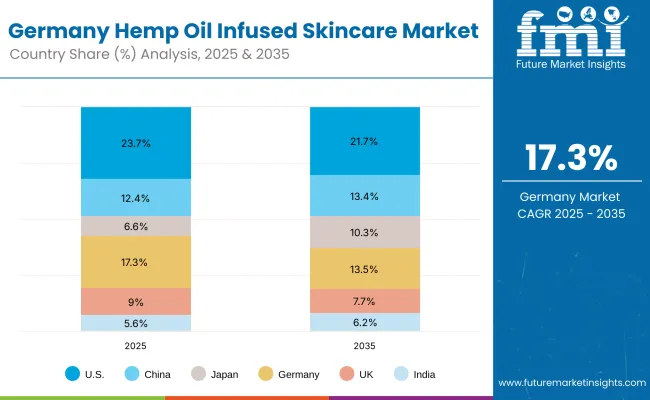
| Countries | 2025 Share (%) |
|---|---|
| USA | 23.7% |
| China | 12.4% |
| Japan | 6.6% |
| Germany | 17.3% |
| UK | 9.0% |
| India | 5.6% |
| Countries | 2035 Share (%) |
|---|---|
| USA | 21.7% |
| China | 13.4% |
| Japan | 10.3% |
| Germany | 13.5% |
| UK | 7.7% |
| India | 6.2% |
The Hemp Oil Infused Skincare Market in Germany is projected to expand steadily, though its global share declines from 17.3% in 2025 to 13.5% in 2035 as Asia-Pacific accelerates. Growth is supported by strong consumer preference for natural/organic claims, stringent EU safety regulations, and the widespread availability of hemp oil-based moisturizers and anti-inflammatory creams in both pharmacies and specialty beauty stores. Germany’s aging population further drives demand for anti-aging and skin barrier repair functions, positioning the market as a strong contributor within Europe.
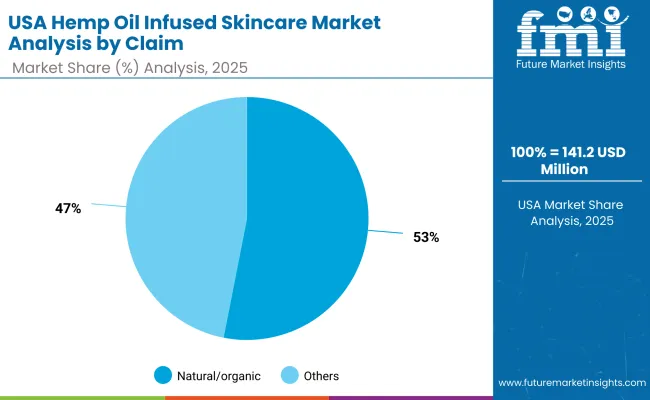
| US by Claim | Value Share% 2025 |
|---|---|
| Natural/organic | 53.1% |
| Others | 46.9% |
The Hemp Oil Infused Skincare Market in the United States is projected to expand steadily, supported by strong demand for natural/organic formulations, which account for 53.1% of revenues in 2025. This dominance reflects consumer trust in clean-label skincare and rising preference for plant-based ingredients backed by dermatologist-tested claims. Growth is concentrated in moisturizing and anti-inflammatory functions, with expanding use in both premium and mass-market skincare. Distribution is led by pharmacies, dermatology clinics, and e-commerce platforms, ensuring broad accessibility.
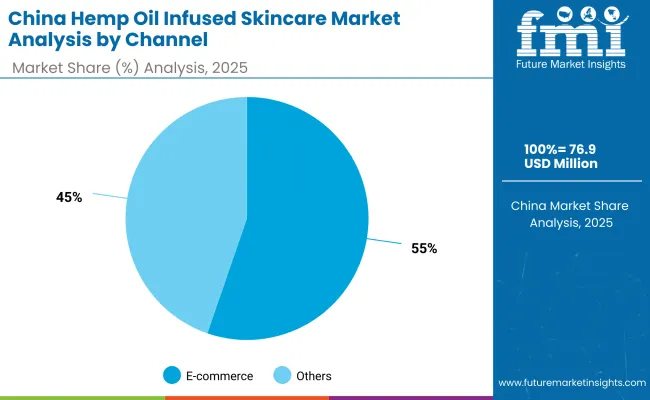
| China by Channel | Value Share% 2025 |
|---|---|
| E-commerce | 55.3% |
| Others | 44.7% |
The Hemp Oil Infused Skincare Market in China is poised for rapid expansion, supported by the dominance of e-commerce, which accounts for 55.3% of revenues in 2025. Online platforms create a powerful opportunity for domestic brands to scale quickly, offering hemp oil-infused moisturizers, serums, and balms at competitive prices. Social commerce, influencer-driven marketing, and cross-border platforms amplify visibility, particularly among younger, urban consumers. With hemp oil aligning strongly to clean-label and natural skincare preferences, China is positioned as the fastest-growing global hub for hemp-based beauty.
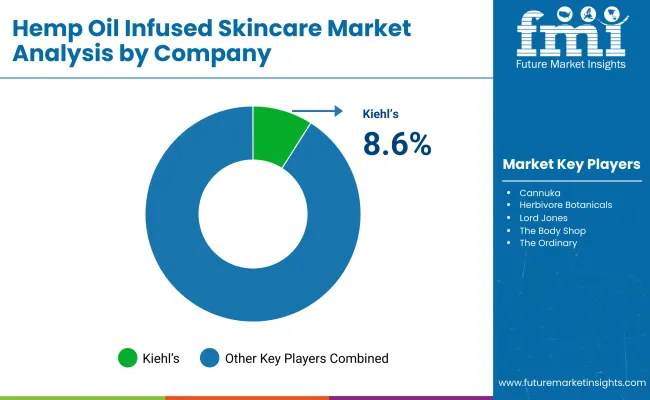
| Company | Global Value Share 2025 |
|---|---|
| Kiehl’s | 8.6% |
| Others | 91.4% |
The Hemp Oil Infused Skincare Market is moderately fragmented, with global leaders, mid-sized innovators, and niche-focused specialists competing across diverse skincare applications. Kiehl’s holds the largest single share at 8.6%, supported by strong brand equity, premium positioning, and widespread retail presence.Mid-sized players such as Cannuka, Herbivore Botanicals, and Lord Jones are strengthening adoption through product innovation, clean-label positioning, and affordability. These brands are expanding rapidly in e-commerce and specialty beauty stores, capitalizing on hemp oil’s natural and therapeutic reputation.
Regional specialists like The Body Shop, Endoca, and Saint Jane focus on sustainability, vegan formulations, and localized distribution, appealing to ethically conscious consumers. Competitive differentiation is shifting from traditional branding to holistic strategies integrating natural claims, sustainability sourcing, digital-first marketing, and direct-to-consumer engagement.As consumer awareness of plant-based skincare accelerates, leadership will depend less on legacy brand recognition and more on innovation in formulation, transparency, and retail channel adaptability.
Key Developments in Hemp Oil Infused Skincare Market
| Item | Value |
|---|---|
| Quantitative Units | USD 1,123.8 Million |
| Function | Moisturizing, Anti-inflammatory, Anti-aging, Skin barrier repair |
| Product Type | Oils, Creams/lotions, Serums, Balms |
| Channel | E-commerce, Mass retail, Pharmacies, Specialty beauty stores |
| Claim | Natural/organic, Vegan, Clean-label, Sustainable sourcing |
| Regions Covered | North America, Europe, Asia-Pacific, Latin America, Middle East & Africa |
| Country Covered | United States, Canada, Germany, France, United Kingdom, China, Japan, India, Brazil, South Africa |
| Key Companies Profiled | Kiehl’s, Cannuka, Herbivore Botanicals, Lord Jones, The Body Shop, The Ordinary, Saint Jane, Endoca, Sephora Collection, Khiel’s Apothecary Preparations |
| Additional Attributes | Dollar sales by product type and function, adoption trends in natural/organic and vegan claims, rising demand for hemp oil-based moisturizers and serums, sector-specific growth in premium skincare, mass retail, and dermatology clinics, revenue segmentation by e-commerce and specialty beauty stores, integration with AI-driven skin analysis and personalized beauty platforms, regional trends influenced by regulatory approvals and consumer awareness of plant-based skincare, and innovations in hemp oil formulations, sustainable sourcing practices, and hybrid skincare-wellness product development. |
The global Hemp Oil Infused Skincare Market is estimated to be valued at USD 1,123.8 million in 2025.
The market size for the Hemp Oil Infused Skincare Market is projected to reach USD 3,733.2 million by 2035.
The Hemp Oil Infused Skincare Market is expected to grow at a 12.8% CAGR between 2025 and 2035.
The key product types in the Hemp Oil Infused Skincare Market are Oils, Creams/lotions, Serums, and Balms.
In terms of product type, the Oils segment is projected to contribute a significant share of the Hemp Oil Infused Skincare Market in 2025, supported by strong demand for moisturizing and anti-inflammatory applications.






Full Research Suite comprises of:
Market outlook & trends analysis
Interviews & case studies
Strategic recommendations
Vendor profiles & capabilities analysis
5-year forecasts
8 regions and 60+ country-level data splits
Market segment data splits
12 months of continuous data updates
DELIVERED AS:
PDF EXCEL ONLINE
Hemp-based Packaging Market Size and Share Forecast Outlook 2025 to 2035
Hemp Animal Feed Market Analysis - Size, Share, and Forecast Outlook 2025 to 2035
Analysis and Growth Projections for Hempseed Milk Business
Hemp Milk Market Analysis by Variant, Type, End Use, and Sales Channel Through 2035
Industry Share Analysis for Hemp Fiber Producers
Hemp Protein Powder Market – Growth, Demand & Health Benefits
Hemp Paper Bag Market Trends & Industry Growth Forecast 2024-2034
Hemp Protein Skincare Market Size and Share Forecast Outlook 2025 to 2035
Hemp Seed Oil Moisturizers Market Analysis - Size and Share Forecast Outlook 2025 to 2035
Hemp Seed Oil Market Trends - Growth, Demand & Forecast 2025 to 2035
Organic Hemp Market Size and Share Forecast Outlook 2025 to 2035
Industrial Hemp Market
Demand for Hemp Seed Oil in EU Size and Share Forecast Outlook 2025 to 2035
Oil-immersed Iron Core Series Reactor Market Size and Share Forecast Outlook 2025 to 2035
Oil and Gas Sensor Market Forecast Outlook 2025 to 2035
Oil Packing Machine Market Forecast and Outlook 2025 to 2035
Oil and Gas Pipeline Coating Market Forecast and Outlook 2025 to 2035
Oilfield Scale Inhibitor Market Size and Share Forecast Outlook 2025 to 2035
Oil-in-Water Anionic Emulsifier Market Size and Share Forecast Outlook 2025 to 2035
Oil and Gas Field Services Market Size and Share Forecast Outlook 2025 to 2035

Thank you!
You will receive an email from our Business Development Manager. Please be sure to check your SPAM/JUNK folder too.
Chat With
MaRIA